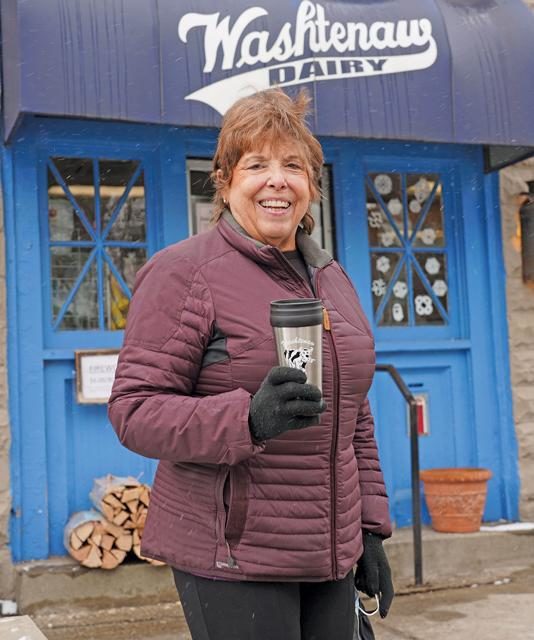Mary Jean Raab was plenty busy in 2016 when her uncle Doug Raab told her he needed help at the Washtenaw Dairy. Retired from a successful corporate career, she was on several nonprofit boards and running a small business giving tours of the city.
But Raab knew that the Dairy was facing a once-in-a-generation crisis: Doug’s younger partner, Jimmy Smith, had died that January. Doug himself was ninety, and waging his fourth battle with cancer.
“I started helping the business in an informal way,” Raab recalls. “A few months later, I bought half the business.”
Her uncle died later that year, leaving her sole owner of the eighty-seven-year-old ice-cream shop and west-side neighborhood hangout. She kept in the background at first, but is becoming more visible as she steers the Dairy through the pandemic.
—
Doug Raab worked at the Dairy for about seventy-five years. He and Jim Smith–Jimmy’s father–started scooping cones while in high school, and bought the business from E.J. and Mae Laubengayer in 1973.
The Laubengayers had just shut down what had been the city’s last working dairy. The new owners kept scooping generous cones using ice cream from other dairies, but also won regular customers year-round with coffee, donuts, and the city’s first Lotto machine. They could often be found behind the counter, pouring coffee or, in early morning, sitting with the regulars, mostly retired guys who joked that their table was the “waiting room for Muehlig’s” funeral home.
When she started, Raab says, “I remained as quiet as I could in public to honor the heritage of the Smiths and Doug.” Though she checks in daily, she’s not the constant presence they were.
—
On the day Michigan dining rooms reopen, Raab sits down for an interview at the regulars’ table, near shelves of brightly colored Washtenaw Dairy T-shirts featuring cheerful cows and whimsical ice-cream cone figures. I’m wearing a mask; following the latest advice, Raab is wearing two.
Her soft brown hair is well coiffed, her nails polished. Friendly but to the point, she would rather talk about the business than herself, especially as it’s navigated the travails of the pandemic year.
“We were dramatically impacted,” she says. Before Covid-19 showed up in Michigan a year ago, “We had orders for weddings and graduations, ice cream, and ice-cream sundae bars,” she recalls. “One by one, everything got canceled, until there just wasn’t anything on the orders board.”
Most people see only the cones and coffee, but there’s another side to the Dairy: wholesale delivery of dairy products (milk, butter, eggs) to restaurants, day cares, and senior centers. The rule of thumb, Raab says, is that half of the sales go out the front door, and half out the back.
“We grieved along with others when restaurants closed,” Raab says. The local Espresso Royale coffeehouse chain had been a longtime customer–and provided about 10 percent of their wholesale business.
When federal Covid relief funds became available, “I think we were some of the first people to apply for the federal PPP [Payroll Protection Program] loans,” she says. A long history with Bank of Ann Arbor helped speed up the process.
Supportive customers left generous donations in the tip jar, and when seated service wasn’t allowed, regulars trooped in to order take-out coffee. To drum up new business, Raab has done everything from ramping up the Dairy’s Facebook presence to reviving a service it dropped forty years ago: delivering milk to people’s homes. Recently, to her great relief, it received a second PPP loan.
—
Growing up near Allmendinger Park, Raab enjoyed trips to the Dairy with her parents and younger brother. Later, she came back with pals from Ann Arbor High. She also enjoyed figure skating, sewing, and singing a cappella.
While still in high school, Raab started waitressing at Bill Knapp’s restaurant on Maple Rd. (where Zingerman’s Roadhouse is now). By nineteen, she had moved into management, developing menus, training new employees, and troubleshooting as the family restaurant chain expanded across lower Michigan and nearby states.
She left Knapp’s in 1992 and two years later joined Borders Books. As it grew from a small group of Michigan stores into an international chain, she was quickly promoted to vice president. Primarily responsible for Borders’ in-store cafes, she also opened their first store in Singapore–but was booted during its first massive downsizing in 2001.
Raab says she’s a Type A personality, and believes that “people skills” are her biggest strength. Dairy financial controller Kathleen Fearday agrees. “She really cares about her staff,” she says. And, Fearday stresses, she hires “very good people.”
After Borders, Raab and her husband, John Boyer, purchased Around Town tours, which ushers prospective U-M hires and others around the city. But it was her volunteer work for Senior Citizens Housing of Ann Arbor that proved most taxing. The nonprofit owned and managed Lurie Terrace, the affordable senior high-rise on W. Huron, where Raab’s grandmother had lived happily.
She joined the board in 1992, after her grandmother’s death. She was president in 2018, when Legal Services and the AARP Foundation sued on behalf of an autistic resident whose family had moved him out under threat of eviction.
The lawsuit was resolved out of court with an undisclosed settlement and a nondiscrimination commitment, but according to a PR rep hired during the litigation, the legal battle strained the volunteer management that had kept Lurie Terrace downtown’s last great housing bargain. “Mary Jean has been spending forty hours a week” on legal and building issues, he told the Observer two years ago. “It has become too much.”
So no one was shocked last year when the board agreed to sell the building to the city. Raab says they looked into hiring professional managers, but decided that the city housing commission was best placed to ensure that the building would remain well-managed and affordable.
She’s still on the Senior Citizens Housing board, along with Washtenaw Literacy and the Community Music School of Ann Arbor. But getting the Dairy through the pandemic absorbs her.
Owning an ice-cream shop was never her dream, but, looking back, she says, “I feel I’ve been training for this job my whole life.” She bought the building from the Laubengayer family three years ago (her uncle and the Smiths had always rented).
And for all her respect for tradition, she’s not afraid to make changes.
She recently had the roof replaced for what she believes was the first time in a century–and installed solar panels while she was at it. She’s also been adding new ice-cream flavors, including “Michigan Pot Hole,” a chocolate-fudge swirl-‘peanut butter cup combo. “People love it,” she says.



Thank you for the excellent profile of Mary Jean Raab by Eve Silberman. As volunteer board chair of Senior Citizens Housing of Ann Arbor she has devoted many years to the careful custody of rental income from residents, and sought out special funds when major repair was needed. The result has been the preservation of a comfortable and safe living space for senior citizens. She has never lost sight of the mission set by the group that created the building – to encourage active resident participation. My seventeen years here have been enriched by her service.
Times change, people change, as a population and as individuals (we age, we have different needs). Lurie Terrace can be the victim of its image. Its location and reputation have led to expectations beyond the scope of the actual facility. Those who value the intangibles, the opportunities for community building in activities, the social relationships, will share my pleasure in being here.
As ownership passes to the city, Mary Jean and the other board members will have some well-deserved relief. Thanks, Mary Jean for you care, your friendship, your time. I wish you and your fellow board members success and satisfaction as you turn to new activities, and for you many tranquil and enjoyable years as the Queen of West Side Ice Cream.
Patricia L. Alvis,
Lurie Terrace Resident,
Lurie Terrace Library Volunteer